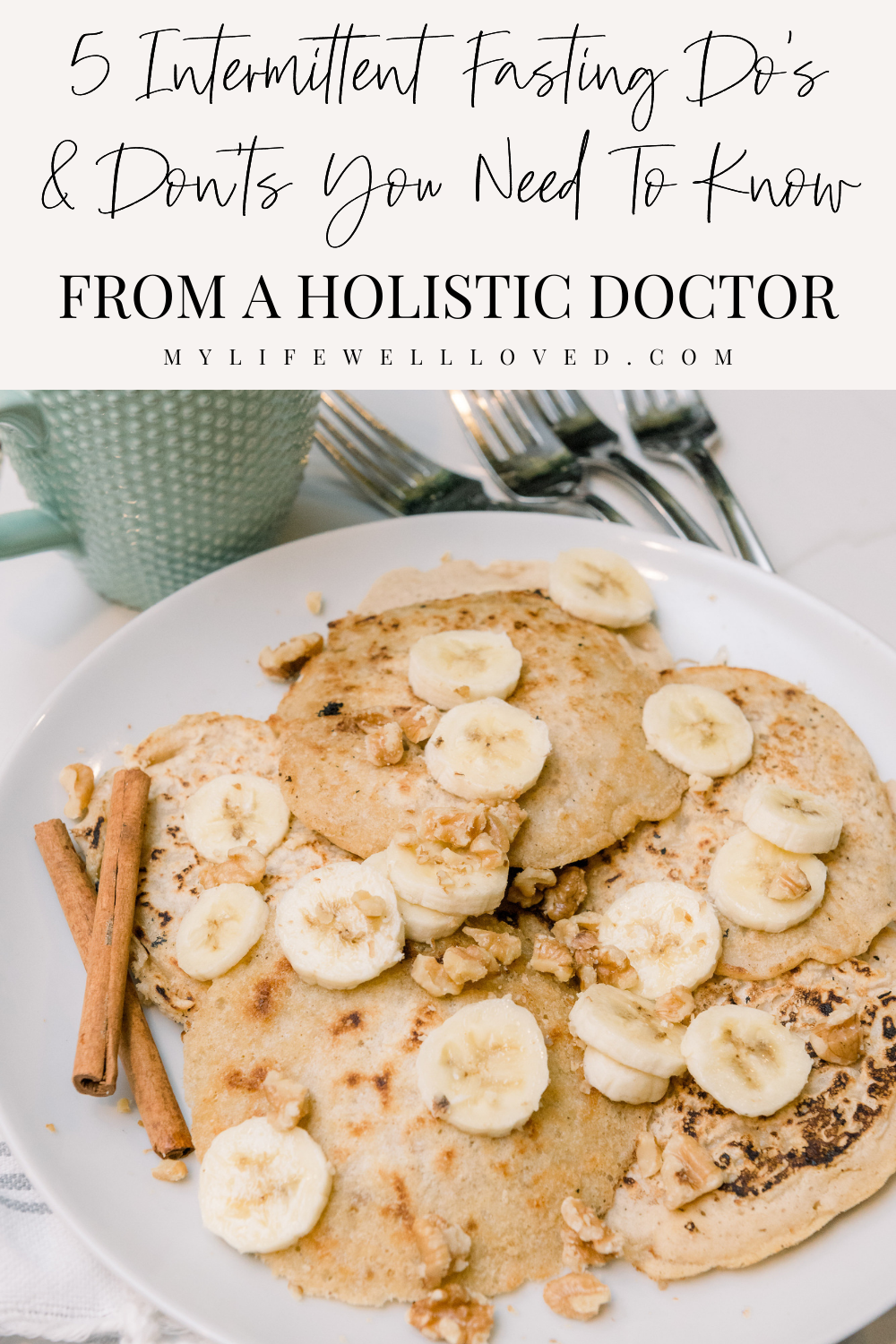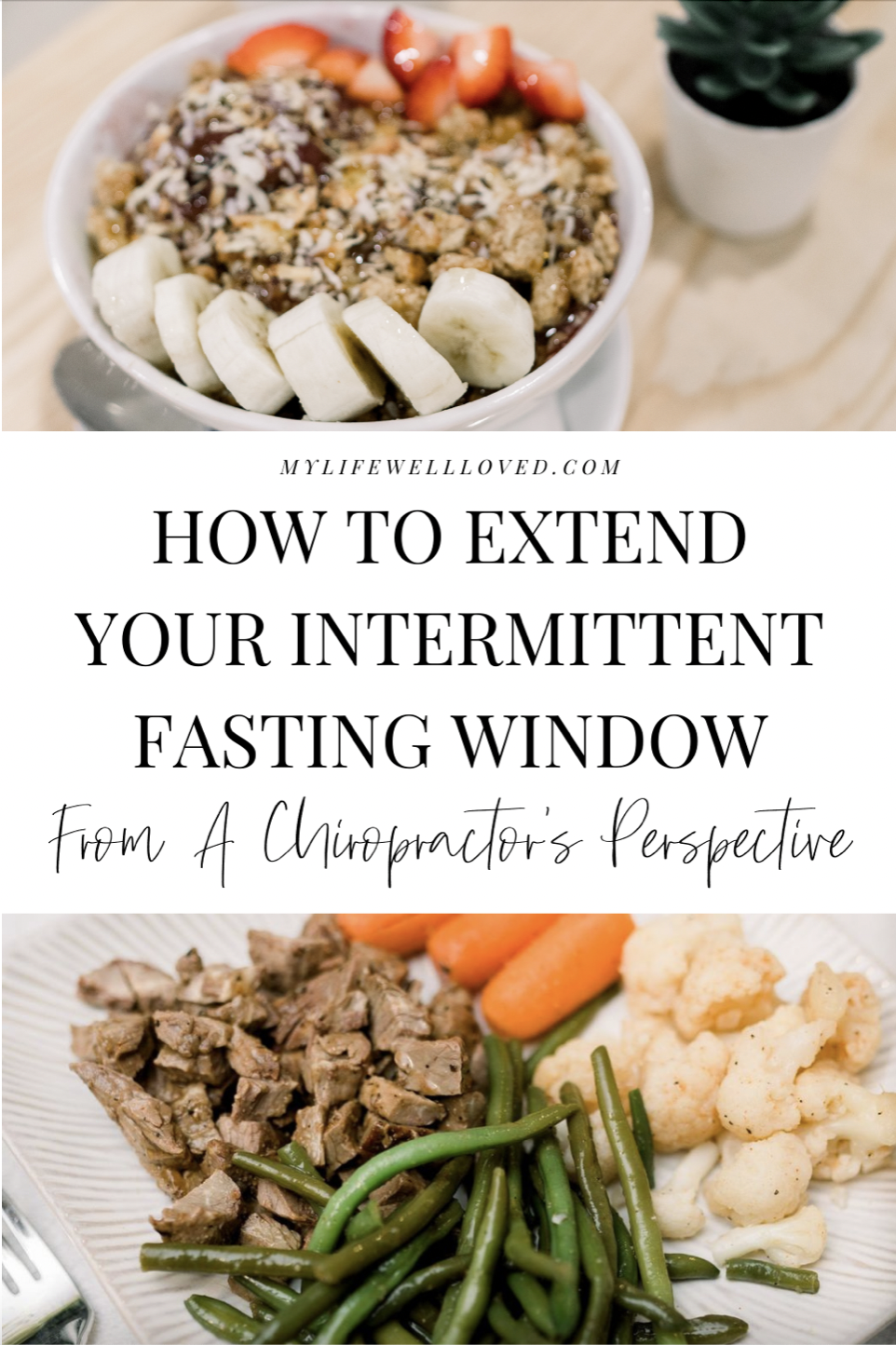Before beginning or implementing any of the following best tips for intermittent fasting or any health & wellness program or exercise regimen, always consult with your healthcare provider.

Shop The Best Tips For Intermittent Fasting Post HERE: Necklace // Earrings // Top + Bottom (Use code FREEGIFTMLWL for a FREE Neck Gaiter) Similar Leggings // Similar Bag // No Show Socks // Sneakers
In part 1 of this interview with my Chiropractor, Dr. John from Archetype, we talked all things Archetype Health, what they do and who they are. Dr. John and I chatted more in-depth about intermittent fasting, why it can have a positive effect on women, how to get started and more!
Definitely be sure to start there if you haven’t read that interview yet! There’s lots of really useful information over there that you’ll want on-hand as you’re going through this one.
Dr. John is a huge proponent of Intermittent Fasting as you can tell! I was excited to talk with him more in depth about it since I’ve been doing Intermittent Fasting through my FASTer Way to Fat Loss program for 3 years now! FWTFL has sold me big time on IF since I started it just after having Finn, to help me lose the baby weight and get back into shape.
Let’s Jump Back Into The Best Intermittent Fasting Tips From My Q&A Interview:

Question #6: If someone has never done Intermittent Fasting before, how would you recommend they get started?
For a lot of people, when they first do it, it will not be a good experience. Because you are literally cranking up an old engine. A lot of times the first few times someone fasts, they never want to do it again because they got lightheaded, experienced caffeine withdrawal, just not a fun situation. They’re wondering why they would want more stress when all of us as Americans, in this modern culture, have a lot going on. We’re already stressed, right?
Our rate of communication these days is so fast and so adding another stressor into that person’s environment make people very adverse to doing that. We’re naturally opposed to pain right?
I would recommend starting off with fasting on a semi-regular basis, like the 2-3 times a week to begin with. That will still give your body some sense of rest and repair. But you want it to be random. It should never be a patterned fasting.
So for me, my two days that I fast for 18 hours are Wednesday and Friday. So that’s random enough to where that would mimic me looking for food if I was “ancestral John”. So you’re not trying to do back-to-back days. What you’re trying to do is separated days throughout the week. You want to do separate because that would mimic a randomness within your existence.

Question #7: In question #3, we touched on how frequently you recommend Intermittent Fasting, can you expand on that a little bit more as related to glucose and the human’s template?
Intermittent Fasting should never be a patterned thing because the one thing that the body thinks that’s happening is, if you’re doing it every day, you’re literally conditioning your body to be even more dependent on glucose. Your body will store that up if you don’t ever fast for over 18 hours. You will store what you get through glucose and fat but then, you don’t use that fat because you’re never going over a 20 hour fast. You will then be, essentially holding onto fat. And then when you were to stop that everyday pattern, you would actually end up accumulating more fat because your body thinks that it’s going to be in another starvation phase every day and a pattern like that is not good.
As humans, we were meant to walk around 18,000 steps a day, which a mind blowing concept in our culture. But that’s what our ancestors did. And so we’re still set up on that “template”. So, think about it if we’re talking about glucose and glucose stability with what our ancestors did. That’s what fasting is – it is built around all of that history of the human and how we operated back then. That’s why I was saying earlier that you’re taking an ancestor of our past and putting them in modern society. That is us. So we should try to follow those dietary habits the way they did. But, we have access to literally everything. We have packets of energy, being processed foods and we just keep ramping up our blood sugar and so that’s why it becomes a problem.

Questions #8: What is the number one reason you personally do intermittent fasting? What is the best way you think it can impact women specifically?
For, I would say humans period, it’s decreasing inflammation. If you decrease inflammation, you increase your ability to repair. So that’s essentially what you’re doing. When we eat three meals a day, with snacks on top of that we have the ability to have a higher rate of inflammation. So the definition of health on a cellular level, is how fast are your cells dividing compared to how fast are they dying off? So if they’re dying off faster because there’s a high rate of inflammation that is injury and a very small amount of cell death.
That doesn’t mean you’re dying but just means that that mechanism is winning, you’re either moving towards health or death. I don’t mean that in a morbid sense, but it’s actually pretty awesome in the sense of like, if you’re not pouring into your health, you’re literally trending towards death.
If you’re not pouring into your health, you’re literally trending towards death.
DR. JOHN – ARCHETYPE HEALTH
And then I mean, depending on where you are, hopefully you have a long way to go right? But if you then think about if a person has say, a heart issue or just had a baby or just ran a marathon or is training really hard, not sleeping really well, etc. That’s a stressor on your body. And so the reason why you intermittent fast is so that you can dampen as much inflammation as you can. You’re being proactive and then allowing repair and that innate intelligence, that beautiful intelligence that heals our body to do its job. And repair itself.

Question #9: Talk to people about when they first start intermittent fasting. What do you recommend that they eat pre fast and recover posts fast so that it doesn’t wreck their system?
So if you’re doing a shorter fast, you don’t have to be as targeted to what you’re eating pre-fast. It is good if you eat fats, if you eat things that you essentially would have always had access to. Things that essentially don’t spike your glucose. If you’re eating something like Lucky Charms before a fast, you’re not going to have a good time. Because what ends up happening is that spikes your blood sugar. It will peak and valley a lot. Let’s say I drank a Slurp-ee or something. That would destroy my glucose stability. And it would make that fast really freakin’ hard.
You’ll want to keep it to things like quality fats, protein, things that aren’t going to take a high level of enzymatic activity (enzymatic activity being like, how complex is that thing to break down and how many different ingredients are in the thing that you ate?). You won’t want to be eating something that’s highly processed. With processed foods, you can often have up to 200 ingredients in just one thing. I would say find something that has below 5 ingredients. That just makes it easier for your body to not disrupt that glucose stability.
Post-fast is going to be the same thing. You want to make sure that you don’t, you know, eat a box of cookies or something. You’re going to want to because your brains going, “I want energy now!”. So try to stick to much of the same as you’d eat pre-fast.

Question #10: Is there anything else you’d like to add? As far as what archetype does how it can help people? Any last words I guess about intermittent fasting you would want anybody, you know?
Gosh… a lot of the times people will ask us, “why do you do what you do?”. It’s more so just to get people to get their quality of life back or enhance their quality of life. It’s not necessarily that someone’s broken and then they come in and we fix them, but it’s more so like, “hey, if I’m working well, how do I make my life better?”. The human body a lot of the times when we go to other professionals, they want to get into these specific things of like hormone replacement or drugs or medicine and sometimes, you just really need to go back to the basics.
If I could say one thing about wanting to change your health, you have to be able to understand the basics really well. I would say that’s what we do really well here – getting back to the basics. I would always like to call myself a generalist. I’m going to get in and understand the basics first, and then we’re going to get to the specifics.
The human is the human and so you have to get back to the basics, build the foundation, and then demand the body to be more specific after you’ve paid attention to those foundations.
CHECK OUT MORE FASTING POSTS HERE:
SHOP The Best Intermittent Fasting Tips Post Below:
PIN The Best Intermittent Fasting Tips Post For Later!







